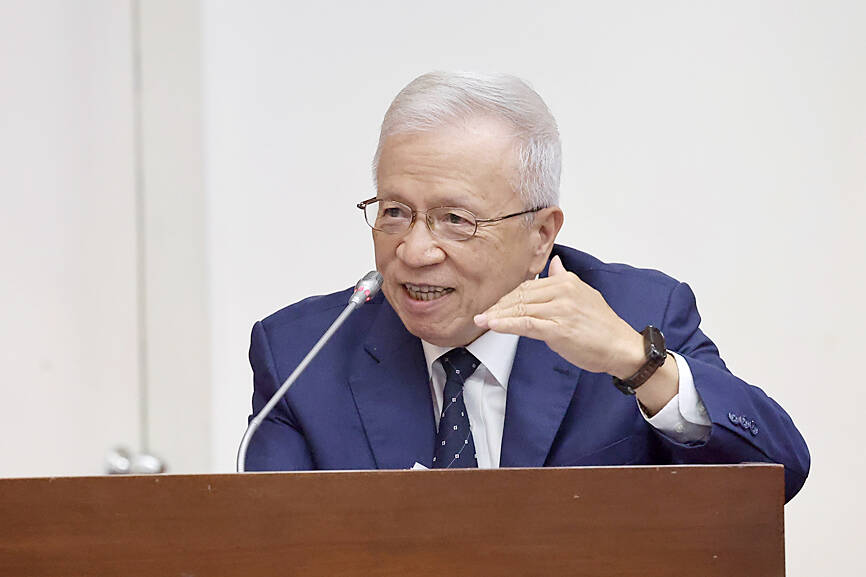The local property market has cooled down moderately following a series of credit control measures designed to contain speculation, the central bank said yesterday, while remaining tight-lipped about potential rule relaxations.
Lawmakers in a meeting of the legislature’s Finance Committee voiced concerns to central bank officials that the credit control measures have adversely affected the government’s tax income and small and medium-sized property developers, with limited positive effects.
Housing prices have been climbing since 2016, even when the central bank imposed its first set of control measures in 2020, Chinese Nationalist Party (KMT) Legislator Lo Ting-wei (羅廷瑋) said.

Photo: CNA
“Since the second half of last year, the property speculation situation has improved significantly,” central bank Deputy Governor Yen Tzung-ta (嚴宗大) said.
The central bank has no intention to crack down on the real-estate market, butit aims to lower the potential for speculation, which affects the nation’s financial stability, Yen said.
KMT Legislator Lin Tzu-ming (林思銘) urged the central bank to revisit its credit control policy, saying that most young people are still struggling to buy a home.
The central bank has eased credit controls slightly during the last monetary meeting in September, allowing second homebuyers to apply for new mortgages after selling their house within 18 months, longer than the previous 12-month requirement, Yen said.
In response to KMT Legislator Lai Shyh-bao’s (賴士葆) question about the possibility of further easing credit control measures, Yen said the central bank would adjust its policy at quarterly meetings based on internal reviews.
Lai said he feared that the central bank’s credit controls led to a significant reduction in tax revenue from house and land transactions.
Tax revenue fell 32.6 percent year-on-year last month to NT$4.35 billion (US$139.96 million), Ministry of Finance data showed.
During the first 10 months of this year, income from the property transaction tax contracted 2.9 percent annually to NT$83.25 billion, it showed.
Separately, Directorate-General of Budget, Accounting and Statistics (DBGAS) Minister Chen Shu-tzu (陳淑姿) told the legislature that Taiwan’s economic growth this year would exceed 5.5 percent, and could approach 6 percent, as the country benefits from its position at the forefront of the global artificial intelligence (AI) boom.
KMT Legislator Lin Te-fu (林德福) asked the minister if the economy faced risks from a potential AI bubble.
AI development, which is being led by tech giants, is producing stable profits, Chen said.
The growing number of practical applications for AI, as well as the sustained demand for computing power, indicates that it would continue to be profitable, justifying an optimistic outlook, she said, adding that Taiwan has a leading role in the AI sector.
Additional reporting by CNA

PERSISTENT RUMORS: Nvidia’s CEO said the firm is not in talks to sell AI chips to China, but he would welcome a change in US policy barring the activity Nvidia Corp CEO Jensen Huang (黃仁勳) said his company is not in discussions to sell its Blackwell artificial intelligence (AI) chips to Chinese firms, waving off speculation it is trying to engineer a return to the world’s largest semiconductor market. Huang, who arrived in Taiwan yesterday ahead of meetings with longtime partner Taiwan Semiconductor Manufacturing Co (TSMC, 台積電), took the opportunity to clarify recent comments about the US-China AI race. The Nvidia head caused a stir in an interview this week with the Financial Times, in which he was quoted as saying “China will win” the AI race. Huang yesterday said

Japanese technology giant Softbank Group Corp said Tuesday it has sold its stake in Nvidia Corp, raising US$5.8 billion to pour into other investments. It also reported its profit nearly tripled in the first half of this fiscal year from a year earlier. Tokyo-based Softbank said it sold the stake in Silicon Vally-based Nvidia last month, a move that reflects its shift in focus to OpenAI, owner of the artificial intelligence (AI) chatbot ChatGPT. Softbank reported its profit in the April-to-September period soared to about 2.5 trillion yen (about US$13 billion). Its sales for the six month period rose 7.7 percent year-on-year

MORE WEIGHT: The national weighting was raised in one index while holding steady in two others, while several companies rose or fell in prominence MSCI Inc, a global index provider, has raised Taiwan’s weighting in one of its major indices and left the country’s weighting unchanged in two other indices after a regular index review. In a statement released on Thursday, MSCI said it has upgraded Taiwan’s weighting in the MSCI All-Country World Index by 0.02 percentage points to 2.25 percent, while maintaining the weighting in the MSCI Emerging Markets Index, the most closely watched by foreign institutional investors, at 20.46 percent. Additionally, the index provider has left Taiwan’s weighting in the MSCI All-Country Asia ex-Japan Index unchanged at 23.15 percent. The latest index adjustments are to

CRESTING WAVE: Companies are still buying in, but the shivers in the market could be the first signs that the AI wave has peaked and the collapse is upon the world Taiwan Semiconductor Manufacturing Co (TSMC, 台積電) yesterday reported a new monthly record of NT$367.47 billion (US$11.85 billion) in consolidated sales for last month thanks to global demand for artificial intelligence (AI) applications. Last month’s figure represented 16.9 percent annual growth, the slowest pace since February last year. On a monthly basis, sales rose 11 percent. Cumulative sales in the first 10 months of the year grew 33.8 percent year-on-year to NT$3.13 trillion, a record for the same period in the company’s history. However, the slowing growth in monthly sales last month highlights uncertainty over the sustainability of the AI boom even as